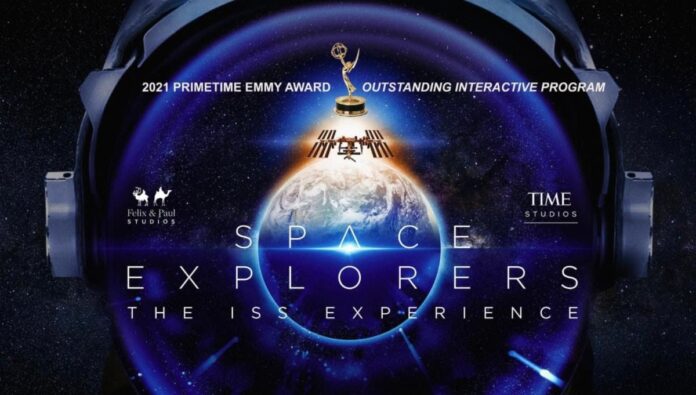Highlights from an Emmy Award-winning virtual reality experience celebrate women living and working in space.
“Women in Spaceflight” launched Wednesday (March 8) on Meta Quest to focus on the women astronauts who were featured in the four-part “Space Explorers: The ISS Experience,” which was released in 2020. The series garnered Canadian creators Felix & Paul Studios a Primetime Emmy Award in 2021 for Outstanding Interactive Program.
The free mini-VR experience, available here (opens in new tab), launched to coincide with International Women’s Day along with Women’s History Month; the latter runs for the month of March.
If virtual reality headsets are your thing, then be sure to check out our best VR headsets and VR headsets deals guides for all the best products and discounts. We also have an extensive list of the best VR space games.
Related: International Space Station facts, history & tracking
The astronauts themselves shot the footage on the International Space Station using specially designed cameras that allowed virtual reality users to swivel their view in real time as a story plays out in the headset. A central focus point is also available for people watching on flat screens.
Prominent women featured include aviator and Mercury 13 participant Jerrie Cobb; NASA astronauts Christina Koch and Jessica Meir, who performed the first all-female spacewalk in 2019; and NASA astronaut Anne McClain, one of the few known LGBTQ+ astronauts.
“My favorite part of ‘Women in Spaceflight’ is Anne McClain’s mom asking if the kids and teachers who ridiculed her dream to become an astronaut worked at NASA —because if they didn’t, then their opinion just didn’t matter,” Katarina Soukup, vice-president of production at Felix & Paul Studios, said in a blog post (opens in new tab).
(opens in new tab)
McClain said her approach was to keep applying for an astronaut job until NASA told her “no” definitively, Soukup said, adding that anecdote was a good example of “the power of cutting out the noise and the naysayers.”
While Soukup said the women astronauts themselves did not want to “fixate on achieving historic milestones because it might mean compromising safety,” she said that women will notch more spaceflight achievements as the types of recruitment become more diverse. For example, in October 2022, Nicole Mann became the first Native American woman to reach space. Mann, a member of the Wailacki of the Round Valley Indian Tribes in northern California, arrived at the ISS on SpaceX’s Crew-5 mission, which will return to Earth this weekend.
NASA counts 73 women astronauts who have flown as of March 2023, but the number increases when considering suborbital journeys. The number of people in space overall is more than 600, again varying depending on which flights are counted. The vast majority of flights used to be by white males, in large part because NASA and other agencies drew from the military, but that has rapidly changed in recent decades amid worldwide efforts to increase diversity.
Elizabeth Howell is the co-author of “Why Am I Taller (opens in new tab)?” (ECW Press, 2022; with Canadian astronaut Dave Williams), a book about space medicine. Follow her on Twitter @howellspace (opens in new tab). Follow us on Twitter @Spacedotcom (opens in new tab) or Facebook (opens in new tab).

